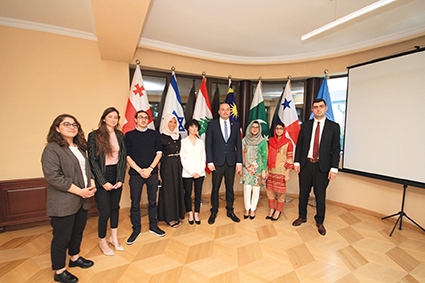Youth 2250: Promoting Peace through Service
The United Nations prioritizes the participation of young people in decision-making processes as part of the UN agenda on youth. One of the key forms of youth participation at the UN is the youth delegate program. The program encourages the inclusion of youth delegates into a member country’s official UN delegation. While the program is coordinated at the UN level, member states run their own internal processes to select youth delegates to send to New York.
Each country also determines the roles that their youth delegate will play, but most advise and consult their delegation on issues related to youth and participate in the general support work of attending meetings and informal negotiations.
The youngest of the current Georgian youth delegates is 21-year-old Lika Torikashvili, selected in August of last year. Torikashvili, as a full member of the Georgian delegation, takes part in the events and committee hearings of the General Assembly. The Georgian youth delegate program is supported by the Ministry of Foreign Affairs.
Torikashvili had an impressive resume even before being selected to join the UN delegation. She runs the non-profit project Paint the World, Gauperade Samkaro, which she founded in 2012 with the idea to unite young people with diverse cultural backgrounds through community service. Paint the World is the leader of Peace Week, an annual project that promotes diversity, tolerance, inclusion, and, of course, peace. This year, Torikashvili spearheaded the International Peace Conference ‘Youth 2250,’ which was held in Tbilisi last week.
United Nations Security Council Resolution 2250 outlines the key role that youth has to play in peace building and peace negotiations. Torikashvili’s vision is for Georgia’s youth to be the facilitator of a peace meeting between young leaders from Georgia, Israel, Pakistan, Malaysia and Panama. The main idea of the peace project “Youth 2250” is to unite youth from conflicting countries through volunteerism.
“The initial idea is to unite Muslim, Jewish and Christian young people, as well as young people from countries in conflict,” explains Torikashvili. “While in Georgia, participants will get to know each other, make friends, get to know Georgia and our culture, and most importantly, volunteer in local centers for people with disabilities, as well as elderly shelters. The idea will be to unite youth from the countries in conflict with one goal: to do good for the local community.” The concept is to bring together young people from different cultures and faith traditions, “who wouldn’t normally mix, socially or otherwise,” to work, travel, and learn together. Participants will gain tools to fight prejudice, confront stereotypes, and reject extreme ideologies.
Israel’s Youth Delegate to the UN participated in the project, along with Kainat Riaz and Shazia Ramzan from Pakistan, who were hit by Taliban bullets on a Pakistani school bus in 2012 in the same attack that severely injured Nobel Prize Laureate Malala Yousafzai.
Through the ‘Youth 2250’ project, Torikashvili and her team delivered lectures on the UN’s Sustainable Development Goals (SDGs) to young people in various parts of Georgia. In the framework of the Peace Project, Torikashvili organized a forum on SDG5, Gender Equality, called ‘SDG Generation: How to turn goals into achievements.’ The forum hosted 10 successful women from different backgrounds, who talked about their stories and gender inequality issues they faced on their road to success. “The main idea of the forum was to break gender related stereotypes and show young Georgians that if you have a goal, nothing is impossible,” says Torikashvili. Ramzan and Riaz were the keynote speakers of the forum, along with Karen Sudre, Israel's Youth Representative to the UN, and Aziza Azizanan, the founder of Paint the World in Malaysia. The participants also met with the Prime Minister of Georgia and the Vice Speaker of the Israeli Parliament Knesset, Yehiel Hilik Bar.
Torikashvili explains, “It was an unprecedented meeting of the Lebanese, Pakistani and Malaysian young people with the Member of Israeli Parliament, where Mr. Bar presented his vision of the solution to the Israeli Palestinian conflict; we all discussed the solution which was suggested, and even agreed on some aspects of it- a very big deal when we are taking about youth from countries which do not even have any diplomatic relationships with each other. And the fact that those conversations and this Peace Meeting happened in Georgia is a huge achievement.”
Torikashvili shared a specific moment of the event with GEORGIA TODAY: “After the discussions, Aziza, who is very passionate about the Palestinians and their rights, went to Mr. Bar and gave him a hug. She said, ‘Mr.Bar, all this time I thought that Israel was a monster. All this time I thought that you do not care about the Palestinians. But now, after I heard you speak, I realized that it is actually possible to make peace with Israel. And I will, as a future politician, do my best to make that happen.’ The fact that this peace meeting fostered that kind of a conversation is already a sign of success towards SDG16: Peace.”
The project was supported by the Israel-Georgia Chamber of Commerce in the scope of Israel Week.
Torikashvili has a youthful, optimistic message: “Peace in the world begins in Georgia. And we, the youth of Georgia, will facilitate this process!”
By Samantha Guthrie
Photo: Lika Torikashvili












